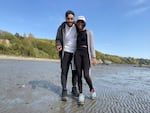
Anthony and Marlie Love are the creators of "Traveling While Black in Seattle." They recently visited Portland.
courtesy of Anthony and Marlie Love
When Anthony and Marlie Love moved to Seattle in 2019, they knew they wanted to explore their new home. The Loves moved from the Midwest, and were uncertain about how they would be treated as Black people as they explored unfamiliar neighborhoods in Seattle and other places around the Pacific Northwest.
“We weren’t really sure what places we would feel most comfortable,” Marlie Love said.
After a trip to Vancouver, British Columbia, the couple decided to create “Traveling While Black in Seattle,” a YouTube channel that rates different destinations based on several criteria, including how welcome Black people may feel while visiting there.
The Loves recently documented their trip to Portland. While the city earned generally high marks, the Loves didn’t give Portland the highest comfort rating.
When a person of color visits a new place and doesn’t see a lot of diversity, Marlie Love said it can create a feeling of “uneasiness,” which she said stayed with them during their short visit to Oregon’s largest city.
Their experience with the town of Forks, Washington, however, fared far worse.
Forks was the setting for the young adult romance novel “Twilight’' and its sequels. But in recent years, the town and county have also been the backdrop for racial controversy. In 2020, residents mistook a bus occupied by a racially diverse family of campers as antifa. Residents questioned the family in a grocery store parking lot and when trying to leave their camping area, the family was blocked in by felled trees.
And when the Loves recently visited, they too didn’t feel safe in town.
“It sounds weird to say, but I’m thankful for the experience,” Anthony Love said. “Because it sort of tested Marlie and I’s, for lack of better words, ‘social experiment.’”
“Everybody stopped, looked at us, stared at us,” he said. “And not curious stares, but kind of dangerous stares.”
The couple felt so uneasy that they slept with a chair blocking their room’s door and left early in the morning. After posting about the experience, followers agreed that the town can leave some feeling unwelcome.
“I too agree that Forks is not worth the drive,” said one YouTube user in the post’s comments. “Everyone working at the shops didn’t seem happy to see my Asian friend and I walk through their shops. I can definitely understand how you two felt uncomfortable in that town.”
While road trips are more common today, it was in the 1930s that car access became more widely available for many Americans.
With the rising popularity of road trips, Victor Hugo Green, a Black postal worker, created the The Negro Motorist Green Book, a travel guide that helped Black travelers safely navigate all parts of the U.S. Marlie Love’s grandmother had a copy. In fact, the idea for the Loves’ current YouTube channel was inspired by the Green Book.
And in Central Oregon, the state’s history of racism is still palpable, as one influencer learned. Nelson Holland is an outdoors enthusiast and influencer on social media. His Tik Tok account, “Fat, Black and Gettin’ It” documents his adventures exploring nature and showcases the inclusive side of hiking.
Holland visited Bend to work with Jenny Bruso, the founder of “Unlikely Hikers,” on a photoshoot with Eddie Bauer.
After picking up supplies, on his way to dinner, Holland said somebody called him a racial slur while crossing the street. He posted the experience online.
“That’s when I found out a lot of the problematic things that have happened in the area,” he said. “At that time my followers and my friends let me know that ‘yeah, you are in a problematic area and you should stay safe and let people know where you’re at.’”
Holland learned about different incidents that have happened in Bend. Last year, Barry Washington Jr., who was Black and unarmed, died after he was shot by Ian MacKenzie Cranston, who is white. The incident happened after Washington complimented Cranston’s fiancée in a nightclub.
Related: Barry Washington Jr.’s shooter to be jailed until trial
More recently, Black students have been called racial epithets and some students have left full-time in-person instruction because of it.
After Holland’s experience, he discussed the incident with Bruso and the other hikers.
“They turned my head space around to where I could just enjoy the day hiking with them,” he said.
Holland had mixed feelings about coming back to Oregon after the incident. But because of the support he received, he said he would return but not without safeguards.
“I definitely wouldn’t drive,” he said. “I wanted to take a road trip through there, but I don’t think I would do that. And I would only go with a local that knows the area well.”
Nelson Holland and Anthony and Marlie Love spoke to “Think Out Loud” host Dave Miller about their experiences:
